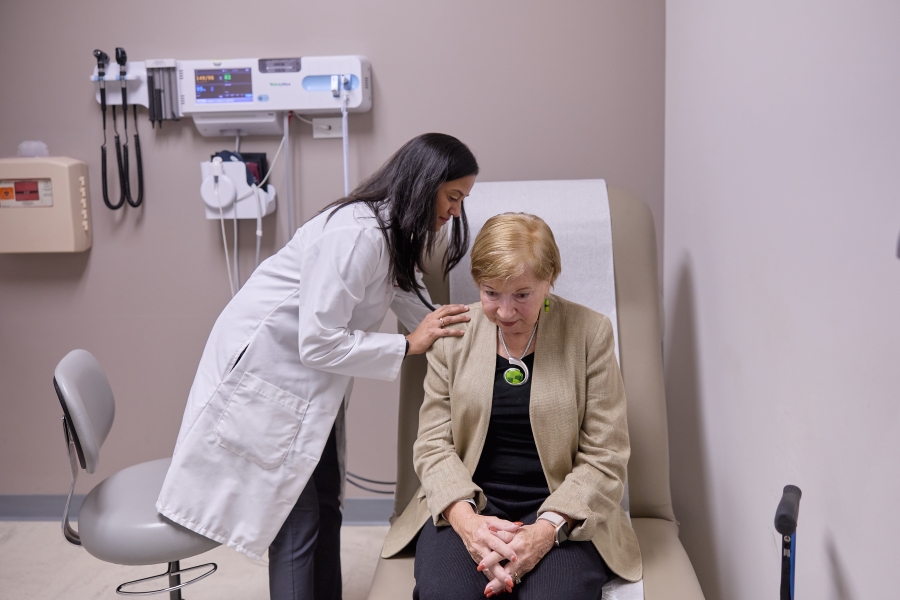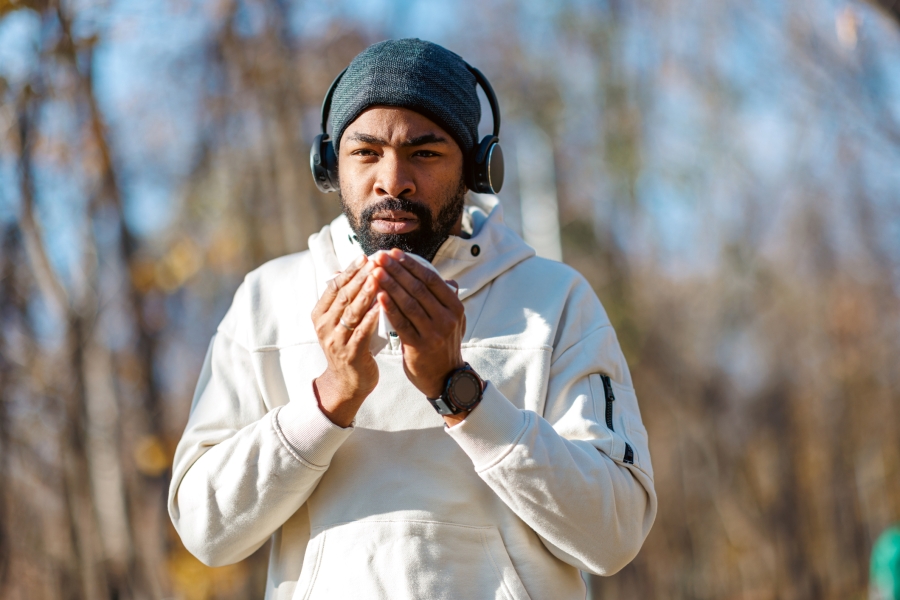There are many highly effective treatments for serious lung diseases such as asthma or chronic obstructive pulmonary disease (COPD). But sometimes a lung disease progresses to the point that conventional treatments may not work very well, and patients struggle to breathe. Their quality of life diminishes considerably. However, when that happens, they may still have an option: joining a clinical trial.
At the Temple Lung Center we’re able to offer access to clinical trials that are evaluating new therapeutic options for people who have a chronic lung disease and that often make patients feel more hopeful about their condition.
Many of these clinical trials are not commonly available at other centers in the region. The pulmonary physicians at the Temple Lung Center are on the cutting edge of developing new treatments for serious lung disease.
Patients at the Temple Lung Center are excited to learn about clinical trials. They may have heard them mentioned in the media, but they don’t know the details about them. As a clinical trials research nurse, part of my job is to educate our patients with lung disease about pulmonary clinical trials. Here are some of the most common questions I am asked.
What is a clinical trial?
A clinical trial is a research study in which new medical therapies are tested with close monitoring. These treatments and interventions are usually developed by pharmaceutical or biotechnology companies, researchers, or other medical experts. Each study answers specific questions with the end goal of finding better ways to prevent, diagnose, or treat a disease.
How does a clinical trial work?
Clinical trials recruit participants for their studies. Each study has specific criteria for participants. These standards can include gender, age, type of disease, and progression of disease. Previous treatment and medical history can limit participation, as well.
There are usually four phases of a clinical trial:
- Typically less than 100 people are recruited for a phase 1 trial, which is focused on safety and side effects.
- Once a treatment has been found safe, phases II and III include more participants and focus on if the treatment works and if it is better than other treatments currently available.
- If a treatment is found effective in a phase III trial, it is submitted to the Food and Drug Administration (FDA) for review.
- Once a treatment is approved by the FDA, the agency continues to monitor the treatment for safety and effectiveness for several years as part of the phase IV trial.
Why should I want to participate in a clinical trial for lung disease?
Participating in a pulmonary clinical trial can:
- Help you learn more about your disease or condition.
- Provide you access to therapies that aren’t available to the general public. This can be especially important if standard therapies haven’t worked for you.
- Allow you to be even more closely monitored than before. You’ll have a whole team of doctors, nurses, and other providers who will be checking on you to see how you are handling a treatment. They will also be available to answer any questions or concerns you may have.
- Empower you to play an active role in your own healthcare.
- Give you a chance to advance medical research and possibly help others with the same disease or condition. Many of our patients in clinical trials are hopeful that not only will they benefit from a new treatment, but that others will in the future too.
How do I learn more about a clinical trial and join one?
Here are the main points to know if you’re interested in participating in a clinical trial:
You’ll receive key information about the study from our Temple team
This is called informed consent, and it continues throughout the study.
As part of informed consent, members of our research team explain what’s involved with participating in the study. If English isn’t your preferred language, translators and interpreters are available. We want to make sure you understand all the details of the clinical trial.
You’ll learn details about the study
Those include the purpose of the study, how long it’s scheduled to last, and what procedures will be done as part of the research. The research team will provide a document that outlines all of this, as well as potential benefits and risks of participating. You’ll also find out who you can contact if you have questions or would like further information.
You make the decision about being in the trial
After you get all of this data, you decide whether or not you want to participate.
If you do decide to join a clinical trial, you’ll receive either the treatment being studied in the trial or a different one
Depending on the type of trial, that different treatment could be the current standard of care or a placebo — an inactive substance that looks like the drug or treatment being studied. You, your care team, and the research staff might not know which treatment you’re getting. This helps our care team and researchers observe objectively.
How long will I participate in a clinical trial?
Each research study is different. You may participate in one phase but not another. However, phase I usually lasts several months. Phase II can last several months to two years. And phase III can last from one to five years.
Are clinical trials safe?
An institutional review board (IRB) approves and monitors clinical trials. The job of the IRB is to ensure that the risks are as low as possible and the potential benefits outweigh any risks.
The IRB is made up of physicians, statisticians, patient advocates, and other members of the community. The group can stop a study if it’s causing unexpected harm or if the risks are too high. They can also stop the study if the results are clear. Then, the goal is to make the treatment widely available as soon as possible.
Understand the benefits and the risks
Like any treatment, clinical trials come with benefits and risks. Participating can provide access to therapies that aren’t available to the general public. It can also empower you to play an active role in both your own healthcare and medical research that can help others. However, risks can include side effects that are uncomfortable or even serious. Clinical trial treatments may not be effective for some people - and a study may require time for travel or care.
With all of this in mind, know that if you participate in one of our clinical trials, you can withdraw from the study at any time and for any reason.
What types of clinical trials for lung disease are available at the Temple Lung Center?
We offer a variety of clinical trial opportunities for people with lung disease. Each year the Temple Lung Center enrolls hundreds of lung patients in clinical trials.
At any given time, we may offer studies for people who have:
- Asthma
- Chronic bronchitis
- Chronic obstructive pulmonary disease (COPD)
- COVID-19
- Interstitial lung disease (ILD)
- Pulmonary fibrosis
- Pulmonary hypertension
Is there a trial that’s right for you?
You can browse the clinical trials at the Temple Lung Center. And you can reach our research team at [email protected] or by calling 215-707-1359. We will work with you and your lung-care team to determine if there’s a study that’s right for you.
Helpful Resources
Looking for more information?


